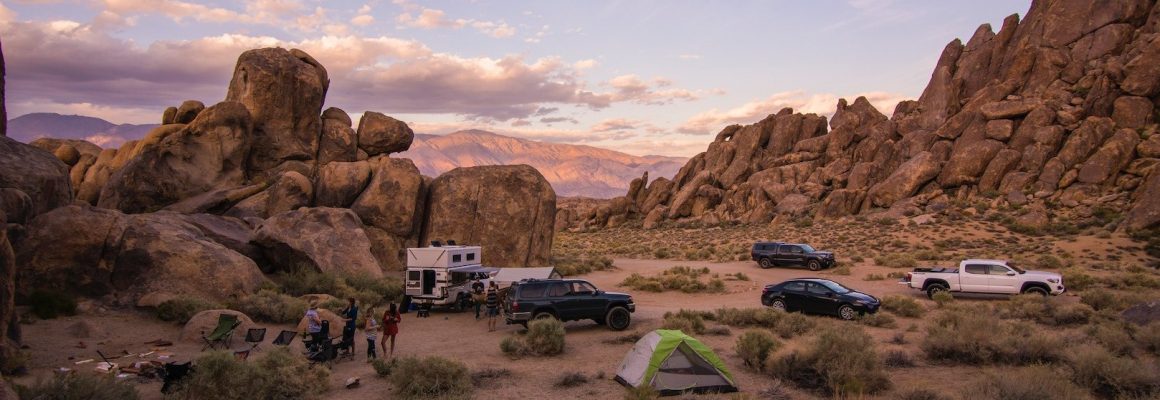Truck Camper vs. Travel Trailer: Which is Right For You?
Susan J

If you want to enjoy upleveled camping or the convenience of taking your roof with you on the road, your options are limitless. Narrowing down those options can be overwhelming. If you want to use your truck to haul your RV, you have two main choices: truck campers or travel trailers. Both of these options rely on a tow vehicle, but that’s about where the similarities end. If you’re unsure which is best for you, take a look at this guide. We’ll share the pros and cons of each so you can make the best decision for your individual needs.
What’s a Truck Camper?
A truck camper is mounted on the bed of a truck. Models are available that feature pop-ups and slide-outs to expand the space when you’re parked and ready to camp. They come in a variety of sizes to fit all types of trucks — from small pickups to one-tons. Their compact size makes them ideal for taking into tight areas or for travel on rougher roads. Larger truck campers include a toilet, shower, and cooking facilities. Truck campers will sleep between three and five people, depending on the model.
If you want space and amenities but still want to stay within a truck camper framework, the Lance 1172 is a good example of everything you can get in a truck camper. From double slides to giant windows and skylights to the dinette opposite a dry bath and a galley with flip-up counter extension, this truck camper will make you forget you’re in a truck camper. Lance is an industry leader and manufactures a broad selection of truck campers for both short bed and long bed trucks.
What’s a Travel Trailer?
Travel trailers are campers that tow behind your vehicle. They typically have sleeping quarters, a bathroom, kitchen facilities, and a separate living space. Travel trailers come in many different types, in a variety of sizes and with a wide selection of amenities:
Conventional — Conventional travel trailers can be towed with any six-cylinder vehicle if you choose the right size and weight. They’re easily detached from the vehicle when you arrive at your campground, making them convenient. They feature a full living space, including kitchen, dining, bathroom, entertainment, and storage areas. Some models offer slideouts to expand the living space.
The Airstream Classic is a prime example of this type of travel trailer. It has a cult following for a reason. Smart Control Technology allows you to control everything from the awnings to the temperature with your smartphone. High quality amenities and finishes delight owners and keep them loyal fans for the long haul. Airstream offers access to owners’ club chapters around the world and an annual caravan tour.
Fifth Wheels — Fifth wheels are very similar to conventional travel trailers, but they have a raised forward section that provides extra space via a bi-level floor plan. They require a special hitch. Fifth wheels often include panoramic windows, making them a popular choice. Many models offer slideouts, and they’re also easy to detach from the tow vehicle.
We recently reviewed the Coachmen Chaparral 298RLS, and we highly recommend this fifth wheel. With ten floorplans to choose from, you’re sure to find a configuration with the features that you want. It’s a lightweight option with plenty of space and features, including an entertainment center, backup camera, USB charging ports, 8-cubic-foot refrigerator, 30-inch microwave, 21-inch oven, dual pane windows, and oversized under bed storage. And you can get a 2018 model for under $50,000 at many dealerships.
Expandable Travel Trailers — Expandable travel trailers (also called hybrids) feature ends that pull out to provide sleeping space. They’re lightweight and typically smaller than conventional travel trailers or fifth wheels, but they do feature a toilet, shower, cooking range, and storage. They’re also easily detachable.
Dutchmen’s Coleman may be the most well-known expandable travel trailer. Colemans come standard with many fantastic amenities like quality furniture, residential-grade flooring, and large holding tanks. The Coleman comes in a range of floorplans, so you’re sure to find one that you like.
Toy Hauler — Toy haulers come in a variety of sizes with various amenities depending on the model. Their primary differentiator is that they feature a wide ramp door in the back of the trailer. They typically have larger freshwater tanks and built-in generators for those who want to camp away from civilization. They have collapsible furniture to maximize space while hauling. They’re also built to handle bumpy roads.
Forest River’s Stealth FQ2817 is a spacious example of what you can get with a toy hauler. The 17’ 9” cargo space gives you room for myriad toys. The aerodynamic profile makes it easy to tow anywhere, and it comes with a dizzying selection of available features and equipment.
Comparing a Truck Camper with a Travel Trailer
Roominess: Travel Trailers Win
As you’d expect, travel trailers give you much more space. Even the smaller versions will offer room to spread out. You’ll also enjoy more and better amenities with all that room. From better sleeping quarters to easier cooking, the space availability that travel trailers provide equals a higher-level experience. If you’re going to be camping for longer time periods, the travel trailer in any of its forms will be more comfortable for you.
Affordability: Truck Campers Win
Since travel trailers come in such a wide variety of types, their pricing varies wildly. But truck campers are always going to be more affordable, since there’s just not as much to them. If you’re looking for an easy way to get into the RV lifestyle, a truck camper is a great option. And it’s not just the cost to buy the RV that you’ll need to consider. The operating cost of a truck camper is also much less, since it’s lighter weight and won’t require as much fuel to carry.
Ease of Ownership: Truck Campers Win
One of the best things about truck campers is that they’re easy to store. You can store them in a garage, eliminating the need to pay for storage elsewhere. Most homeowners associations have restrictions on the size of vehicle that you can keep in the neighborhood, so you’ll typically need to store a travel trailer in a facility or at another off-site location away from your home.
Maneuverability: It’s a Toss Up
While truck campers are hands-down more agile, toy haulers are also built for rugged conditions and wind. If you need to maneuver down tight city streets, a truck camper will be your best bet. But if you only need something that can handle off-road conditions, a toy hauler will do the job just as easily while providing more room and space for all your stuff.
Caring for Your Truck Camper or Travel Trailer
No matter which option you choose, you’ll want to protect your camper or trailer while it’s in storage. A high-quality RV cover will shield it from harmful UV rays, moisture, and other damaging elements, ensuring you’ll enjoy your camper or trailer for years to come.

